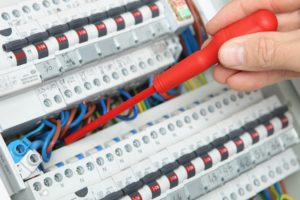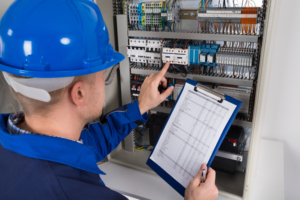The Importance of Electrical Testing
Electricity is a crucial element in modern living, without it there would be no lighting, no heating and no internet. Clearly, we need electricity, but we also need to make sure that our electrical supplies are safe. Electricity, after all, is a powerful form of energy, and one which can quickly become unstable; it also has the potential to cause huge damage and even death. Therefore, it’s important that your electrical supplies are correctly tested.
What are the Types of Electrical Testing?
Electrical testing is a legal requirement that landlords and business owners must adhere to. They need to be able to demonstrate that their electrical systems are safe to use, and the simplest way to prove this is through electrical testing such as:
- Electrical Installation Condition Report (EICR): this report is used to analyse a building’s electrical and wiring systems to determine their condition. The first step involves completing a visual assessment to pick up on any visual clues that the systems are damaged e.g. cracked wiring, signs of burning and any breaks in the system. The next step delves deeper and involves dead testing the wires and investigating the quality of failsafe systems alongside earthing and bonding checks. If your system is deemed to be compliant with regulations, the electrician will then issue your EICR.
- Portable Appliance Testing (PAT): one of the most recognisable electrical tests is the PAT test. This involves individual electrical devices – such as kettles, computers and portable heaters – being tested to identify any faults. These tests include checking any plugs, plug sockets, cables and appliances which are powered by your electrical supply. Once these devices are shown to have passed continuity, insulation and lead polarity tests, an electrician will be able to confirm they are safe to use.
It’s important to bear in mind that whilst an EICR will only need completing every five years, PAT tests should be completed on stationary and IT equipment every four years while extension leads and portable equipment should be tested every two years.
What Will Fail an Electrical Test?
Electrical tests are complex and comprehensive, so an electrical supply needs to be in excellent condition to pass. The following problems will cause supplies and appliances to fail electrical testing:
- Electrical equipment or supplies which are overloaded
- A lack of adequate earthing or bonding
- Any issues that indicate there is a risk or fire or electrical shock e.g. split wiring
- Evidence of poorly completed electrical work
- Electrical appliances being used incorrectly
- Incorrect fuses being fitted to electrical appliances
- Damaged plugs and sockets
Electrical Tests are Vital
The importance of electrical testing cannot be overstated. Living and working with dangerous electrical supplies is dangerous for everyone involved. Therefore, it makes sense to establish a regular testing schedule for your electric supplies and appliances. Not only will this provide you with peace of mind and safety, but it will ensure you comply to legal requirements.
Who Can Carry Out Electrical Testing?
The only person who can carry out electrical testing is a registered electrician. Regardless of your own experience and knowledge, unless you are a registered and qualified electrician, you should never attempt to carry out electrical testing yourself. Not only will the results of the test be void, but you risk harming yourself and damaging your electrical supply
For additional electrical articles please visit our main BLOG page here





